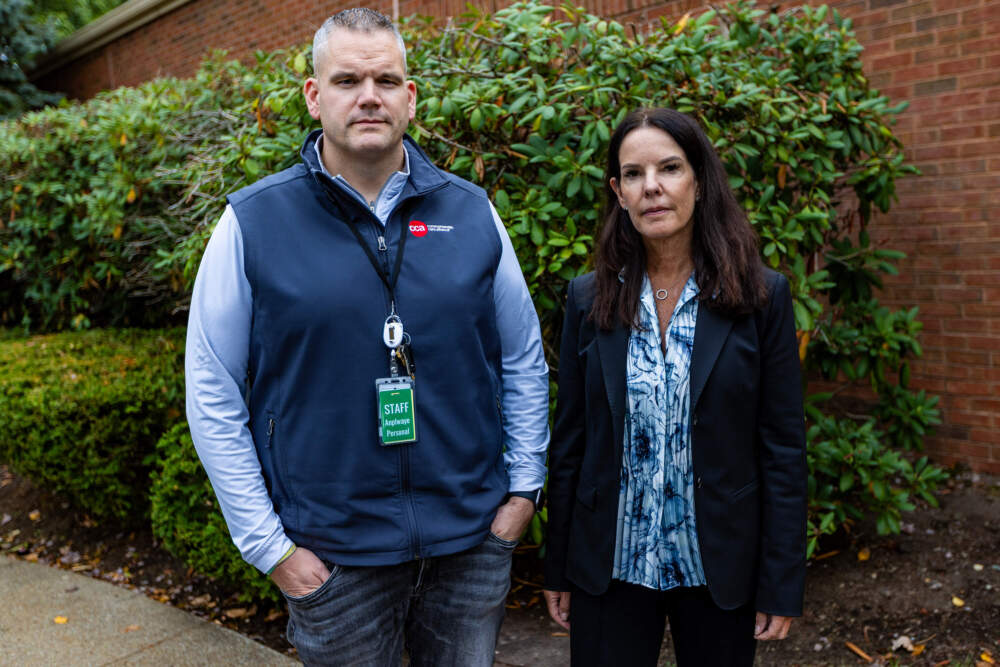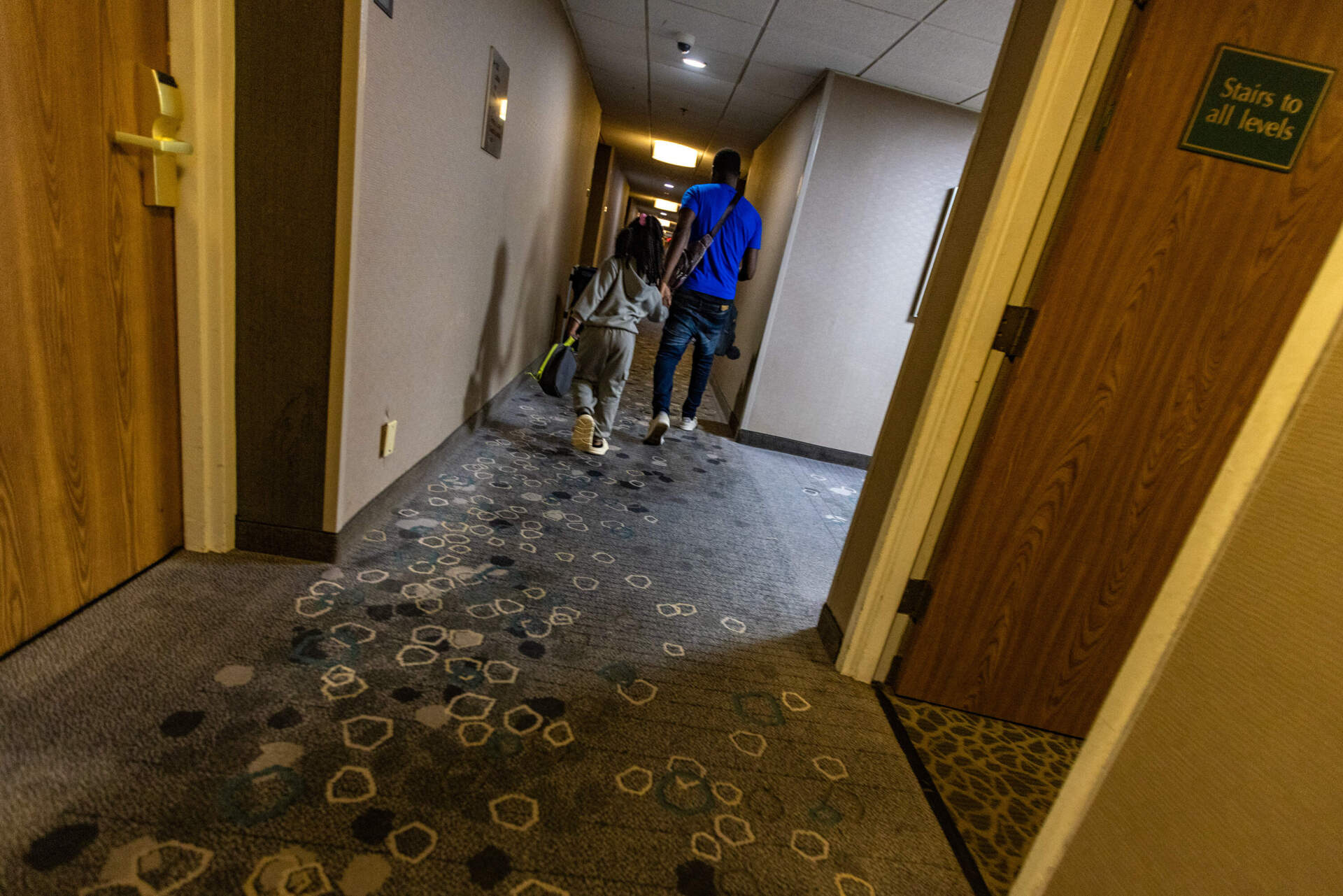STOUGHTON — A few blocks from the highway, across from a gas station and an office complex, a tarp covers the sign for a former hotel. The building is now a shelter for more than 130 families, mostly from Haiti, who’ve found their way to Massachusetts.
The lobby buzzes with dozens of people, some with babies in their arms, others talking to caseworkers about how to process work papers or find housing.
Frantz and Heroína Edouard and their two daughters share a room here with two queen-size beds and a bathroom. There’s no kitchen, but caterers serve up three meals a day in the lobby. Frantz sees it as a blessing that his family has a place to stay.
“One has to be thankful for everything,” he said. “If we didn’t find this system that does so much for us, we would be in a bad place.”
This story was supported by the Pulitzer Center. Illustration for WBUR by Lily Qian.
The interviews for this story were conducted in Spanish.
The Edouards came to Boston in August of last year after a long trek from Brazil and frustrating stints in others states. They’d heard there was help in Massachusetts and decided to try their chances here. But as they settled in, the political climate started to change — costs surged to care for new arrivals, and politicians, including the Republican candidate for president, were stoking hostility toward immigrants.
The Edouards focused on their immediate future in this blue-collar town about 20 miles south of Boston. They were among the first families placed in Stoughton, back when the hotel was still hosting other guests.
“It was only later that a lot of Haitians started to arrive,” Heroína said. “That’s when they closed the hotel to only receive foreigners.”
As more families poured into the state, the governor declared a state of emergency and activated the National Guard to oversee and provide basic services at shelters like the one in Stoughton. The hotel felt clean and new, but with so much communal living, tensions sometimes flared among guests. Heroína said at one point, she and Frantz were helping distribute supplies, and other Haitians accused them of hoarding diapers and clothing.

Living in the confines of a small room, cut off from normal life routines, felt to Heroína like being in jail at first. But with time, she said, many of the families grew closer and helped watch each other’s children.
“All the kids in the hotel want to visit our room,” she said proudly. “We sing and make them smile and play music for them.”
But for their older daughter, 20-year-old Ana, most days brought on boredom — and a gnawing sense of isolation.
“I don’t talk to anyone,” she said. “I just stay in the hotel, studying, which is good of course. But I’m here all day without doing anything else.”
Ana said she felt depressed at times. She wanted to enroll in community college, but she needed to get her high school records translated from Portuguese, and that would cost money. And she knew she’d have to learn English to achieve her goals.
For all the frustrations of months spent in a hotel room, it was a relief being in a place where basic needs were covered: food, education and health care. “Both of my daughters have anemia, and here, thank God, they’ve given us access for them to be in treatment,” Heroína said.
Fransheily, the Edouards’ 7-year-old, was fast learning English at school. As she advanced in the first grade, her dad worked nights cleaning hospital rooms. He hoped that would lead to a valet parking job at the hospital, and eventually, to a career as a long-haul trucker.
Heroína said she was up for any job she could land. But she struggled to get work documents.
“I’m worried about a lot of things,” she said. “I’m not used to just waking up and sitting around. And I’m worried because my husband only brings home $400 a week.”
With that money, she said, they’d have to repay what they borrowed to get to Boston. And finances weren’t their only problem. Before long, the state would notify shelter residents they could stay for only nine months. The family would have to find somewhere else to go.
Demand for shelter skyrockets
The Edouards are among a wave of recent migrants to Massachusetts from Haiti and other countries in turmoil. While the state doesn’t track the total numbers, the Immigrant Family Services Institute, a major local aid group, says it has served more than 26,000 Haitian families over the last three years.
Word spread fast in migrant circles that Massachusetts was a welcoming state. Families with children and permission to be in the U.S. qualify for help under the state’s “right to shelter” law, which for decades promised shelter to unhoused families.
But as demand for shelter beds surged in mid-2023, officials rushed to find space. The state struck lease agreements to turn 59 hotels into shelters.

“This was an urgent, emergent situation,” said Lauren Easton of the Commonwealth Care Alliance, a nonprofit tapped to manage nine of the hotels, including two in Stoughton.
Most of the residents are Haitian, with some Venezuelans and U.S. citizens as well. They all have something in common, Easton said: the desire to become self-sufficient. For now, they need resources to get work permits, enroll kids in school, learn English and search for permanent housing in a region with high rents and a shortage of apartments.
On top of case managers and legal aid, the nonprofit oversees teams of security guards, nurses and interpreters fluent in Haitian Creole and Spanish. Easton said the goal is to create a “safe, warm environment” for guests, many of whom went through “incredible trauma” before finding shelter in Massachusetts.
Local pushback
Across the state, some residents and politicians have rejected the presence of migrants in their communities.
“Stoughton is a beautiful, humble, working-class town,” said Lisa Lyons, who sits on the town’s finance committee and co-chairs its local Republican chapter. “And we intend to keep it that way.”
Lyons believes the shelter law shouldn’t apply to migrants and slammed the state for closing the town’s two hotels to the public. She argues the move is keeping visitors away and discouraging business activity.
“When you have that level of immigration into a community,” Lyons said, “you take it long enough, then, ‘Oh no, time to speak up.’ And the time is now.”
Stoughton Town Manager Tom Calter said he disagrees with Lyons on this, as he does on many matters. In an interview, he noted that those in shelter are permitted to be in the country. He places the Haitians in a long history of immigration to Massachusetts.
“It wasn’t 75 years ago that my people, the Irish, were not welcome,” Calter said. “We’ve overcome those things because we’re America. And I can tell you, Stoughton is a role model for the rest of the commonwealth and the rest of the country right now.”
A recent poll of likely Massachusetts voters found seven in 10 people are “very” or “somewhat sympathetic” to migrants here. But when it comes to shelters, they’re divided along three lines: whether they support the shelter law; whether shelter stays should have time restrictions; and if migrants should be excluded. About 30% of respondents backed each answer.

Calter acknowledged the shelters brought new pressures to Stoughton. He complained early on that the hotel closures would cost the town half a million dollars in lost tax revenue, and the school district would need additional English-language teachers to serve more than 100 new students.
But the state agreed to reimburse the town for the lost tax dollars, Calter said, and to help Stoughton schools hire more teachers.
Peter Durant, a state senator from Spencer, west of Worcester, has argued the state’s benefits have made Massachusetts a “magnet” for immigration. He flipped his Senate seat to the GOP in a special election last November, in part by denouncing the cost of sheltering migrants.
“Aren’t we supposed to be taking care of our own folks first?” is a sentiment Durant said many of his constituents share with others across the country.
As the shelter crisis unfolded in Massachusetts, Donald Trump would top the GOP presidential ticket for a third time. Alongside his promise to “make America great again,” he put anti-immigrant rhetoric at the center of his campaign. Trump would go on to pledge “the largest deportation operation in the history of our country” on the first day of his presidency.
But it’s not just Republicans objecting to the rising costs of shelter services. As more than 3,500 migrant families doubled demand on the shelter system, the price tag ballooned to over $1 billion a year — nearly three times what had been budgeted for.
The state dipped into reserves to make up the shortfall. And then last October, Gov. Maura Healey decided to halt the expansion of shelters.
“We do not have enough space, service providers, or funds to safely expand beyond 7,500 families,” Healey said at the time. Beyond that, Massachusetts would no longer guarantee shelter and would cap stays at nine months, upending its decades-old right-to-shelter law.
Healey even dispatched officials to the U.S. southern border with a message: Massachusetts is full.
Critics said the Texas trip would do little to deter migrants from coming here. But one thing was clear: After the governor started limiting shelter offerings, families like the Edouards could no longer stay indefinitely.
A deadline looms
The family had been in the Stoughton hotel eight months already when the nine-month deadline came down. For Frantz, reality set in quickly.
“We have to prepare, because when we leave here, we’ll be responsible for everything,” he said. “We have to start thinking about saving.”
They wouldn’t be on their own entirely. The state was offering rent subsidies for people exiting shelter — roughly $1,250 a month for up to three years. That’s if they could locate an apartment.
“The change I want is to have a little place of my own, to study, to work — and to see my children grow up.”
Heroína Edouard
The Edouards’ caseworker helped by scouring real estate listings around the region. They applied for a place in a three-story building in Norwood, a little closer to Boston, and waited to hear if they could move in.
The couple was upbeat at the prospect of having their own place. Looking up at the apartment from the outside, Heroína imagined finally leaving the crowded shelter.
“The change I want is to have a little place of my own, to study, to work — and to see my children grow up,” she said. “And one day I’d like to bring my son here.”
Emmanuel, the Edouards’ 22-year-old son, had stayed behind when the rest of the family took the grueling trip to the U.S. It weighed on Heroína that Emmanuel was still in the Dominican Republic, and she felt they could reunite once the family had a home.
But weeks passed with no word about the Norwood place. They ultimately learned it had been leased to someone else. Heroína was crestfallen.
The Edouards had made it through the Darién Jungle to get here, and stuck together as a family after nearly a year apart. Now they wanted to build a life in Massachusetts. But the ground was shifting beneath them, both politically and amid a housing shortage affecting even life-long residents.
Time to find a home was running out.
“If we didn’t find an apartment, we would go to another state,” Heroína said. “But I’ve already gotten used to it here. If you leave, it’s like you have to start all over again.”
This is the second story in a three-part series. The final installment will publish in the coming weeks. Read the first story here.
Author :
Publish date : 2024-11-03 22:32:00
Copyright for syndicated content belongs to the linked Source.
Author : theamericannews
Publish date : 2024-11-04 14:33:41
Copyright for syndicated content belongs to the linked Source.